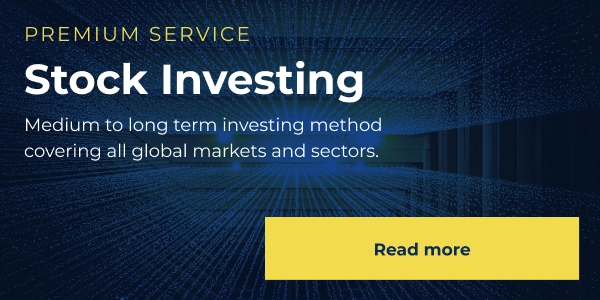On September 30th, when S&P 500 futures closed at 3595 points, the lowest point of 2022, it looked like an epic stock market crash was about to start. The opposite happened: the market set a double bottom on Sept 30th and Oct 13th. The vast majority of investors were tricked into the wrong direction, once again.
Markets are strange.
Whenever you expect them to move in a certain direction, the often tend to go the opposite direction.
We wrote this piece, full of market wisdom: 7 Secrets of Successful Investing. One of the key points in there is that markets tend to react in a way that is opposite to our human, intuitive thinking.
Let’s take Sept 30th, 2022 as a case to illustrate this. The S&P 500 closed at 2022 lows, also multi-year lows. Many investors got scared.
What is the intuitive and human reaction? As a human being, you go look around to gather information and create an opinion.
This is what the environment looks like for investors that looked for information about markets on Sept 30th, 2020:
Barron’s: The Fed Is Starting to Break Things. The Stock Market Is Paying the Price.
The stock market desperately wants to put in a low. The Federal Reserve won’t let it.
Bloomberg: Raging Markets Selloff in Five Charts: $36 Trillion and Counting
Whether super-safe US Treasuries or the riskiest emerging equities, global stocks and bonds have lost a record $36 trillion in value over the past nine months in a wild selloff that engulfed assets right across the risk spectrum.
Barron’s: Bond Market Turmoil Could Last a While. How to Stay Out of Trouble
It is an exciting time for fixed income—and a terrifying one, too. Central banks are in the midst of the most dramatic tightening of monetary policy in a generation, which has helped push yields on some risk-free U.S. Treasuries to 15-year highs. No wonder fixed income is back in vogue as a competitive alternative to equities.
Bloomberg: Stocks Are Taking Hits Everywhere
Spiraling losses on Wall Street are now snowballing into forced asset liquidation, according to Bank of America strategists. The NYSE Composite Index, which includes US stocks, depositary receipts and real estate investment trusts, has broken multiple technical support levels including its 200-week moving average, the 14,000 mark. Now, accumulated losses could force funds to sell more assets to raise cash, accelerating the selloff. Similarly grim milestones keep piling up for Chinese stocks listed in Hong Kong.
Barron’s: The Party Is Over for Semi Stocks. Why the Hangover Will Linger.
The global semiconductor equity index is breaking below its technical support.
The New York Times: The Markets Face a Rare Double Decline
The losses in tech stocks and bonds is wrecking investor portfolios, and analysts warn of more sell-offs.
Aljazeera: US bear market deepens: What that means for you
From high inflation to the war in Ukraine, investors are dealing with a perfect storm of risk.
Bloomberg: Sterling Credit Has Worst Ever Month as UK Chaos Shakes Market
A meltdown in UK assets during Liz Truss’s first month as prime minister has left the sterling corporate bond market notching up its worst monthly return ever.
Bloomberg: Euro-Zone Inflation at Double-Digit Record Piles Pressure on ECB
The euro zone’s economic crisis intensified with the first ever reading of double-digit inflation, piling pressure on the European Central Bank to keep raising interest rates aggressively.
Bloomberg: The Nightmare Numbers Behind Britain’s Week of Market Panic
Bloomberg: ‘Fear Is Contagious’ as UK Crisis Boils Over Into Other Markets
Global market risk surged to highest level since March 2020. UK troubles show how quickly tensions over policy can erupt.
The above articles are scary. There is no way any human being will stay calm. Triggered by the emotional system, the human mind is going to react to all this.
From a contrarian perspective, this is what an epic market bottom looks like.
There is not one single article talking about a potential good outcome. Not anyone is there to calm investors down. The emotion that is created by financial media in a market bottom is overwhelming.
The underlying reason is this: the turning point.
Hardly anyone is able to find a turning point in markets. Turning point analysis is probably the most complicated challenge for investors and analysts. Finding turning points puts the analyst also in a weak position: he/she becomes very vulnerable and the probability of being ‘wrong’ is very high.
Whenever the media attention on a particular topic becomes overwhelming it often coincides with a turning point in a particular market.
Case in point: Bitcoin sinks below $19,000 as crypto meltdown intensifies published by Marketwatch on June 18th. It was an epic buy opportunity in ETH and BTC, it was THE turning point in both assets.
Most investors will not use this situation to learn. We see an epic learning opportunity for investors to understand what a market bottom looks like and compare it to how it feels. Emotions and intuitive human reactions should be taken as a signal, not a reaction to act. Those signals should be compared against leading indicators (data points and charts). Investors need to come to a rational conclusion.
This is what you may conclude based on leading indicators and data points at a market bottom: The Market Will Not Move 50% Lower Contrary To What The Gurus Are Telling You.
Time will tell if the above insights will turn out to be timely wisdom. We will only know in hindsight. In the meantime, because we are going against the tide, we are more vulnerable with our market calls… but we are comfortable with it. So far, the market has proven us right.




